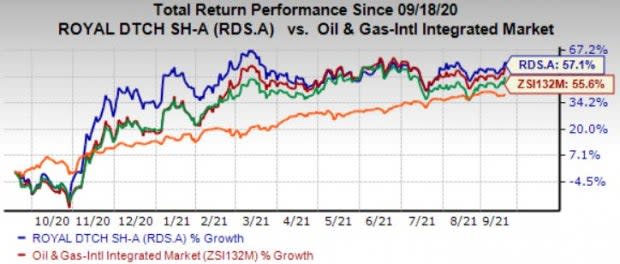Shell (RDS.A) to Build Dutch Biofuels Facility to Cut Emissions
Royal Dutch Shell plc (RDS.A) has made a final investment decision to construct an 820,000-tonne-per-year biofuels facility at the Shell Energy and Chemicals Park Rotterdam in the Netherlands. When completed, the plant will be one of the largest in Europe for producing sustainable aviation fuel (SAF) and renewable diesel from trash.
The new plant will assist the Netherlands and the rest of Europe in meeting globally mandated carbon reduction goals. It will also assist Shell in meeting its objective of becoming a net-zero emissions energy firm by 2050, in line with society's progress toward the Paris Agreement's climate targets.
Shell aims to be a net-zero-emissions energy company by 2050, in line with the society's goals. This currently Zacks Rank #2 (Buy) company wants to restructure its refinery footprint into five key energy and chemicals parks as part of its Powering Progress strategy. As a result, Shell will cut traditional fuel output by 55% within 2030. Following the introduction of the Energy and Chemicals Park Rheinland in Germany in July, the Energy and Chemicals Park Rotterdam is the second park to be launched. You can see the complete list of today’s Zacks #1 Rank (Strong Buy) stocks here.
The biofuels plant in Rotterdam is anticipated to start producing in 2024. Using innovative technology created by Shell, it will manufacture low-carbon fuels such as renewable diesel from waste in the form of used cooking oil, waste animal fat, and other agricultural and manufacturing residual items.
Energy companies are under immense pressure to find new lines of business as investors and activists keep pushing for addressing climate-change issues. The entire energy sector is gearing up for a tremendous change in renewable energy resources for powering all industrial fields as temperatures are rising worldwide due to the emission of greenhouse gases.
The majority of oil and gas supermajors, including BP plc BP and TotalEnergies SE TTE, promised to become net-zero energy firms by 2050 and heavily invest in renewable and low-carbon energy alternatives.
The development of SAF is another strategic path that is being pursued by most of the companies to achieve carbon neutrality as biojet fuels help reduce emissions from air transportation.
Earlier this year, TotalEnergiesannounced that it has started to produce SAF at the La Mèdebio refinery in southern France and Oudalle facility near Le Havre. SAF, which is made from used cooking oil, animal fat, and other waste, will be supplied to France’s airports from April 2021 and aid the company in reducing emissions from air transportation.
Recently, another oil biggie, Chevron Corporation CVX along with renewable energy firm Gevo, Inc. signed a letter of intent to jointly invest in the construction and operation of one or more new facilities to turn inedible corn into SAF, thereby lowering the lifecycle carbon intensity of aviation fuels.
Shell’s SAF Initiatives
This July, Shell signed a memorandum of understanding (MoU) with Rolls-Royce Holdings Plc as part of its efforts to decarbonize the aviation industry and reach net-zero emissions.
Per the terms of the agreement, Shell and engineering company Rolls-Royce will explore opportunities for bringing 100% SAF to certification. Both companies plan to enhance their cooperation on SAF and fully certify its use in planes as it produces 70% less carbon compared with conventional fuel.
In December 2020, Shell’s Shell Aviation entered into an agreement with global logistics services provider, DHL Express to supply the latter with SAF at Schiphol Airport in Amsterdam.
On its part, the deal sets an excellent example of how the aviation industry would expedite its shift toward net-zero emissions as the fuel industry aims to increase the supply of SAF. As commercial airlines are operating at a lower capacity, Shell considers the deal as an opportunity for the cargo sector to increase the uptake of SAF in the aviation industry. Further, the oil and gas major believes that cargo operators can play an important role to prompt the demand signals to boost investment and use of SAF.
Shell has seen its shares gain 57.1% in a year’s time compared with the industry's growth of 55.6%.

Image Source: Zacks Investment Research
Want the latest recommendations from Zacks Investment Research? Today, you can download 7 Best Stocks for the Next 30 Days. Click to get this free report
BP p.l.c. (BP) : Free Stock Analysis Report
Chevron Corporation (CVX) : Free Stock Analysis Report
Royal Dutch Shell PLC (RDS.A) : Free Stock Analysis Report
TotalEnergies SE Sponsored ADR (TTE) : Free Stock Analysis Report
To read this article on Zacks.com click here.
